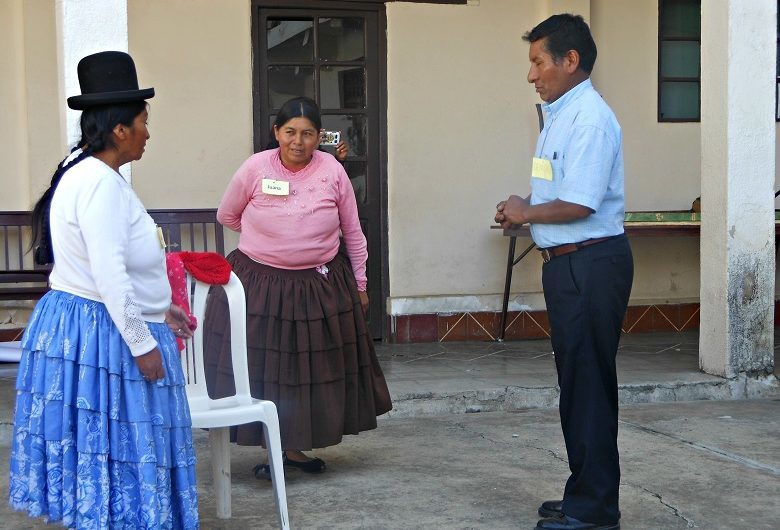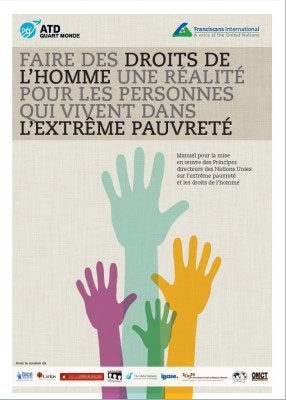The Future of Human Rights in Bolivia

The United Nations has recognized poverty as a violation of human rights. The life stories of people in poverty make this clear. They also point towards effective approaches to human rights problems. A recent seminar in Bolivia examined human rights issues and solutions from the perspective of people experiencing extreme poverty in that country.
New handbook helps guide countries on poverty-related human rights
The adoption of the Guiding Principles on Extreme Poverty and Human Rights (United Nations, General Assembly) in 2012 was a significant victory in the effort to eradicate poverty, since it acknowledged that extreme poverty is the result of human rights violations. The Guiding Principles explicitly identify the actions that governments and other concerned actors should therefore take to ensure that all people are able to enjoy their rights, so that extreme poverty can be eradicated. To raise awareness of these Principles, a handbook has been created and is being disseminated through workshops around the world by people in poverty, institutions and members of civil society organizations.
Forum looks at supporting human rights in Bolivia
ATD Fourth World, together with Franciscans International, conducted a workshop in Bolivia in October 2016 with the aim of presenting this handbook, Making Human Rights Work for People Living in Extreme Poverty. Its goal was to respond to the questions: What do we know about human rights? How can human rights be respected and how are they being respected right now in Bolivia?
The workshop was aimed at organizations that work alongside families who are living in extreme poverty and people with a range of capabilities: Caritas La Paz, San Lucas Foundation, the office of the Defender of the People, the Justice, Peace and Integrity of Creation Commission, Franciscans International and ATD Fourth World. They all reflected on the actions that a society must take to ensure full respect for human rights.
“Before this, I’d never heard of the words ‘human rights.’ We were living like little animals, never having gone to school. My life would have been different if I had gone to school. I like reading and I would love to read more about these kinds of things so I can explain them to my friends.”
Agustina Perez, participant.
The diversity of the participants allowed for a rich exchange on the violations of human rights and the conditions necessary for their full enjoyment. Once again, these encounters demonstrated the ways in which women living in poverty suffer from double discrimination. Even if it takes an immense effort to face up to this reality, Lourdes Martínez, an ally of ATD Fourth World, highlighted the fact that “now there are more women who are standing up and speaking out against it.”
The Guiding Principles handbook consists of four parts and nine sections, three of which were examined during this workshop:
Section 3: Providing the Basic Services Required for Good Health
Section 4: Supporting Families and Protecting and Respecting the Rights of their Individual Members
Section 6: Ensuring Rights at Work and an Adequate Standard of Living.
Suggestions for Change
“Human rights exist. They need to be applied by the government administration. These rights are fundamental and progressive; we need equality.”
Tairon Costa, staff member, Office of the Defender of the People.
After two days of work based on people’s life stories and exchanges, a manual was prepared with suggestions and commitments by the participating people and institutions so that efforts by authorities in regards to different cross-sections of society could be expanded:
- Creating workshops for capacity building and vocational training to develop the social skills to start up family businesses and micro-enterprises and not have to rely on being hired by a company.
- Looking for inter-institutional agreements (with private and public companies, municipal authorities, etc.).
- Conducting training on public law and standards concerning people with varying capabilities, aimed at public employees and authorities, government ministries, schools, educational facilities, etc.
- Working for unity between associations and networks of people with various capabilities.
- Looking for methods to limit the amount of bureaucracy.
- Promoting municipal ordinances so that the municipality supports the needs of people with different capabilities.
- Empowering individuals with different capabilities to demand that projects be designed on their behalf.
“I do not want to be seen as useless”, stated Alicia Chura at the conclusion of her talk. “I can still do something. I can speak and I realize that words are like food, giving you strength to continue fighting.”
Her words highlight the importance of her participation for herself and also for building a society where human rights are a reality for all. The handbook on the Guiding Principles on Extreme Poverty and Human Rights constitutes a truly useful tool for creating spaces to build a society where those who live in poverty can become the real protagonists.


